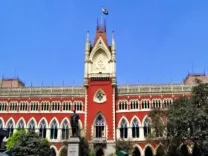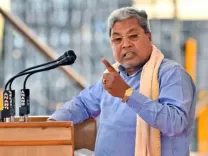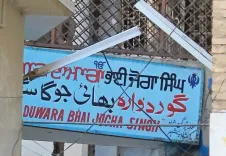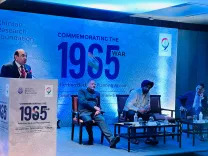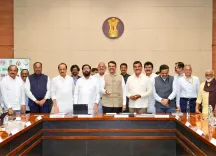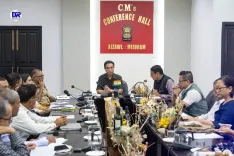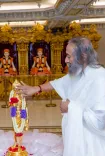Siddaramaiah: Untouchability Endures, Educational Equity Remains Out of Reach
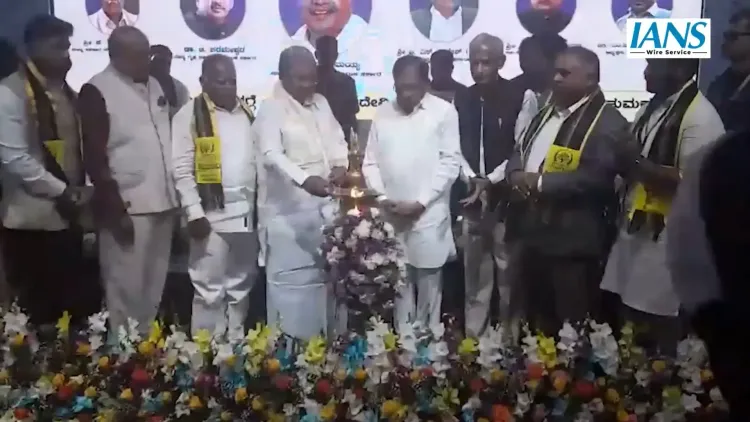
Synopsis
Key Takeaways
- Untouchability continues to exist in India.
- Educational equality remains an elusive goal.
- Historical context shows severe repercussions for seeking knowledge.
- Basavanna's principles advocate for egalitarianism.
- Education is essential for breaking free from caste constraints.
Tumakuru, April 19 (NationPress) Karnataka Chief Minister Siddaramaiah stated on Saturday that untouchability continues to exist in the nation, while educational equality has also remained out of reach.
“The goal and commitment of our Constitution is a caste-free, humane society. However, even today, untouchability continues, and educational equality is still a distant dream. This is a significant concern,” the Chief Minister remarked while speaking at a cultural dialogue organized by the Kuruba Cultural Council in partnership with the Sridevi Group of Educational Institutions.
The event also celebrated the launch of 31 books under the ‘Kuruba Samudaya Samskruti Darshana’ (A Cultural Glimpse of the Kuruba Community) series.
Siddaramaiah recounted that in earlier times, individuals who sought to learn Sanskrit or pursue education faced severe punishments, such as molten lead being poured into their ears.
“Now, we have educational access. We must document our experiences because talent is not confined to any single group. We need clarity in our knowledge and understanding. We must critically and scientifically dismiss the idea of ‘Karma’. Only then can we shatter the chains of subjugation and muster the courage to speak the truth,” Siddaramaiah emphasized.
The Chief Minister urged people not to blindly accept that Kalidasa became a renowned poet merely because Brahma inscribed sacred syllables on his tongue, adding that tales of Valmiki being a bandit should be viewed with skepticism.
“Whenever Shudras gain knowledge and achieve something noteworthy, such narratives are spun about them. Exercise caution,” he warned.
He pointed out that Basavanna, 850 years ago, had already established the groundwork for an egalitarian society through the Anubhava Mantapa (academy of spiritual experience).
“Those who harbor progressive thoughts will invariably face opposition. Hence, one must remain steadfast in supporting such progressive ideals,” he stated, asserting that true equality cannot be realized without it.
“Caste does not evolve. Class does not transform. The caste system is stagnant water; it does not flow. Economic mobility is the only means through which caste mobility can occur. And for that, education is crucial. Education should not be pursued for selfish reasons. Ambedkar proclaimed he pursued knowledge to empower marginalized groups. We must grasp his message. Without the Constitution, neither you nor I would have had the privilege of receiving an education,” he elaborated.
The Chief Minister remarked that caste inequality, exploitation based on caste, and injustice escalated due to the Manusmriti, asserting that the upper caste deceived people by propagating the ‘Karma’ theory as a justification for privilege or suffering.
“That’s why Basavanna renounced the doctrine of karma. I wonder how many among you have rejected it as well. Did Brahma dictate that one person should receive education while another should remain uneducated? Did Brahma decree that one should be impoverished while another should be wealthy? Did Brahma determine that one should eat to their fill while others starve? Is that what God inscribed? The upper castes obstructed Basavanna’s revolution. Therefore, we must think critically and scientifically,” he said.
The Chief Minister stressed that poverty and hunger among the AHINDA communities (minorities, backward classes, and Dalits) across all castes and religions must be eradicated, asserting that no one should have to beg for food.
“That’s why we launched the Anna Bhagya scheme. Kayaka (dignified labor) and Dasoha (service) embody Basavanna’s principles. Everyone should adhere to them. The culture, customs, and ideas of all working classes must be highlighted. Therefore, it is essential for everyone to engage in literary endeavors,” Siddaramaiah concluded.

